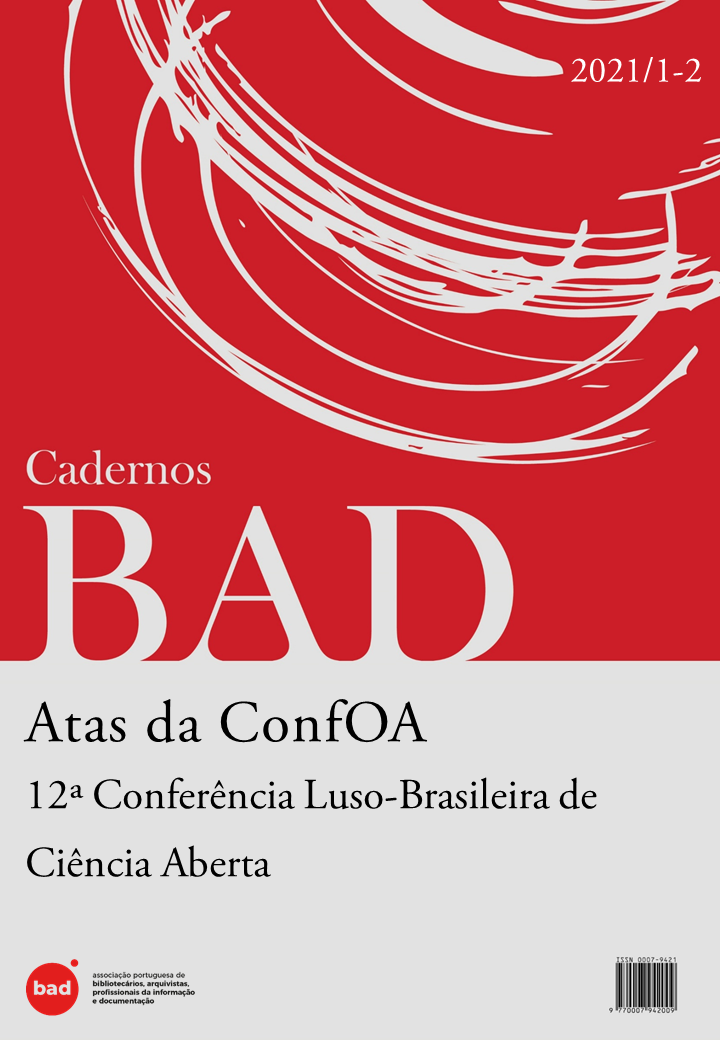The General Data Protection Law and author's rights: a look at the protection of databases
um olhar sobre a proteção das bases de dados
DOI:
https://doi.org/10.48798/cadernosbad.2797Keywords:
Database, Author’s rights, General Data Protection Law, Circulation and Data ControlAbstract
The disordered use of data and information as a result from the advances in information and communication technologies has required special attention regarding the protection of databases, considering their importance for the decision-making process in companies, given the value attributed to information from data processing. In this context, this research aims to analyze the legal relationships related to the legal regime for data protection and personal information by the Brazilian General Data Protection Law, considering the regulation of databases within the Author’s Rights Law domain. For this, it is intended to clarify what is understood by a database, looking at legal and technical aspects that involve them. It examines the legal treatment attributed to databases by the Author’s Rights Law, as well as in the General Data Protection Law for Personal Data. Exploratory and documentary research was adopted as a methodology. Finally, the relationships established in the General Data Protection Law for the Protection of Personal Data in databases considering the Author’s Rights Law are presented. The research concludes on the need for a dialogue among the respective legal sources for the correct circulation and control of data and information.
Downloads
References
BRASIL. Lei nº 9.610, de 19 de fevereiro de 1998. Altera, atualiza e consolida a legislação sobre direitos autorais e dá outras providências. 1998. [Consult. 14 abr. 2019]. Disponível em: http://www.planalto.gov.br/ccivil_03/leis/L9610.htm.
BRASIL. Lei nº 13.709, de 14 de agosto de 2018. Lei Geral de Proteção de Dados Pessoais (LGPD). 2018. [Consult. 14 abr. 2019]. Disponível em: http://www.planalto.gov.br/ccivil_03/_ato2015-2018/2018/lei/L13709compilado.htm.
CHINELLATO, Silmara Juny de Abreu; MORATO, Antônio Carlos. Direitos Básicos de Proteção de Dados Pessoais, o Princípio da Transparência e a Proteção dos Direitos Intelectuais. In: MENDES, Laura Schertel; DONEDA, Danilo; SARLET, Info Wolfgang; RODRIGUES JÚNIOR, Otávio Luiz. Tratado de Proteção de Dados Pessoais. Rio de Janeiro: Forense, 2021. ISBN: 978-85-309-91517.
CIANCONI, Regina de Barros. Banco de Dados de acesso público. Ciência da Informação, Brasília, v. 16, n. 1, p. 53-59, jan./jun., 1987. [Consult. 14 abr. 2019]. Disponível em: http://revista.ibict.br/ciinf/article/view/271.
FAPESP. FAPESP COVID-19 Data Sharing/BR. [Consult. 14 abr. 2019]. Disponível em: https://repositoriodatasharingfapesp.uspdigital.usp.br/.
GIL, Antônio Carlos. Métodos e Técnicas de Pesquisa Social. São Paulo, Atlas, 2006. ISBN: 85-224-2270-2.
SEVERINO, Antônio Joaquim. Metodologia do Trabalho Científico. 23. ed. São Paulo: Cortez, 2007. ISBN: 978-85-249-1311-2.
SOUSA, Rosilene Paiva Marinho de; DIAS, Guilherme Ataíde. A Informação e a Proteção da Propriedade Intelectual. João Pessoa: Editora da UFPB, 2017. ISBN 978-85-237-1202-0.
Downloads
Published
How to Cite
Issue
Section
License
Copyright (c) 2022 Cadernos BAD

This work is licensed under a Creative Commons Attribution 4.0 International License.
Os autores que publicam nos Cadernos BAD:
- Concedem à revista o direito de primeira publicação, mantendo os direitos de autor, de acordo com os termos da Creative Commons Attribution, que permite a partilha do texto com menção obrigatória da publicação inicial nos Cadernos BAD;
- Mantêm o direito de publicar o texto noutros locais (ex.: repositório institucional, capítulo de livro, outra publicação periódica), com menção da publicação inicial nos Cadernos BAD e uma ligação para o sítio na Internet da revista;
- Mantêm a possibilidade e são mesmo incentivados a publicar e distribuir o seu trabalho online (ex.: em repositórios institucionais ou na sua página pessoal) antes ou durante o processo editorial, já que isso pode potenciar interações geradoras de melhoria, bem como aumentar o impacto e a citação do texto publicado (Veja Efeitos do Acesso Livre).


